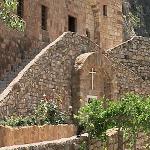05 August 2010

Photo: VOA
The exterior of one of the many houses of worship in Lebanon's Qadisha Valley
This valley is as rich historically as it is visually. It's home to some of the most ancient Christian monasteries, and its natural caves or 'hermitages,' were used as shelters and burial grounds going back more than 10,000 years. Historians say the 10-kilometer-long valley contains at least six houses of worship, including churches, monasteries and convents.
The United Nations cultural organization UNESCO named it a World Heritage Site in 1998 - a designation for places of special physical or cultural value. Now UNESCO is warning the Lebanese government to clean up Qadisha or it could be removed from the World Heritage list.
Riad Keirouz is head of the "Committee for Safeguarding the Qadisha Valley." The group is working to preserve the valley's integrity.
"The Maronites have never had, and will never have, any site like the Qadisha Valley, in the future, to present the Maronitism as a culture and as a civilized community ... so it's really our pride," said Keirouz.
Maronite Christians are the dominant religious group in the area. Over the years, the valley has served as a refuge for those in search of solitude, not just Christians, but Sufi Muslims, too. For tourists, the serenity is palpable.
"It's a place full of prayer, you are in nature, and you can let yourself go, forget all the traffic, pollution, honking, people in bad moods, so you come here just for .... ZEN," said one tourist
UNESCO requires that World Heritage Sites maintain their original character, but Qadisha is changing. New construction is worrisome, said UNESCO's Abdel Moneim Osman. "We are concerned about two aspects of the character, whether it is the material character, that is, you build or you construct something, or the spiritual character."
Osman says other concerns include sewage, unregulated restaurants, and the use of all-terrain vehicles for recreation.
UNESCO has sent a warning letter to Lebanon's Minister of Culture. But if violations continue, an official warning could follow, and eventually a recommendation to declassify the site.
Preservationists have been working to retain the site's status by promoting awareness among Lebanese and reaching out to the media. They recently circulated a petition to help save the valley as a World Heritage Site. They got more than 5,000 signatures, including Lebanon's President Michel Suleiman.